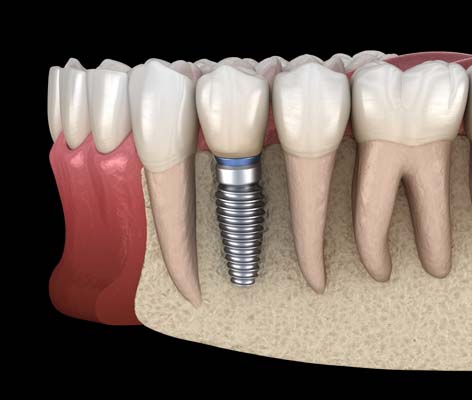What to Expect During and After a Bone Grafting Procedure

Bone grafting makes it possible for those with limited bone tissue to get dental implants. The effects of poor oral hygiene go well beyond horrible breath and yellow teeth. If patients do not promptly address oral health concerns such as tooth decay and gum disease, they could lose their teeth. If they spend too long living with missing teeth, they could suffer from bone loss. While bone tissue loss is not reversible, bone grafting can help create a stable and robust foundation for dental implants so that patients can reclaim their smile.
Why is dental bone grafting necessary?
Not everyone needs a bone graft. Bone grafting is only necessary if the jawbone has deteriorated to a point where it cannot support the dental implant adequately. Bone grafting ensures the jawbone is thick, dense and wide enough to support the screw that the dentist places into it during the dental implant procedure.
What to expect during the procedure
The bone grafting procedure typically takes place in a hospital or surgeon’s office, depending on the specific circumstances and the size of the graft the patient needs. First, the dentist takes an X-ray of the patient’s mouth and uses the images to make a model for planning the procedure. At this time, patients should talk to their doctor about the surgery and anesthesia options. Usually, the oral surgeon uses local anesthesia or IV sedation during the surgery.
The oral surgeon starts by removing the bone from another part of the body, such as the hip or the back part of the jaw. If the patient does not want to use their bone, the oral surgeon can use synthetic bone-like grafts.
The surgeon proceeds to make an incision at the graft area before placing the bone piece and anchoring it into place with screws. The surgeon may use a membrane over the integrated bone to make it easier to stitch up the incision.
What to expect after the bone grafting procedure
The patient will experience a bit of discomfort and pain after the bone grafting surgery. Their face may swell up due to the procedure. The person may also notice some bleeding and facial/sinus pressure.
The dentist may prescribe anti-inflammatory medication to help with the pain. He/she may also give the patient an antibiotic to reduce the risk of infection. Applying ice to the area can help reduce the pain, stop the bleeding and keep the swelling down.
To ensure success, patients should drink plenty of fluids and refrain from smoking. They should also avoid any salty, spicy or acidic foods or fruits as these can irritate the wound. Furthermore, patients should avoid mouthwashes, and use a simple saltwater rinse three times a day to cleanse the area.
Individuals who have undergone grafting surgery should not skip any meals, but they should limit their diet to soft foods, smoothies, and soups. It is also vital that they continue maintaining oral hygiene so that the wound heals properly. Patients should avoid strenuous activities that could disturb the surgery site.
Sleeping after surgery
Dentists advise patients to sleep on their backs and to use pillows to raise their heads. Elevating the head reduces the risk of blood pooling at the site of the bone graft, thus preventing inflammation and swelling. If the patient finds it impossible to sleep on his/her back, he/she should avoid sleeping on the side where the surgeon placed the bone graft.
Talk to us today about this great minimally invasive option
Are you due for a bone graft procedure? It sounds a lot scarier than it is. In most cases, it is a minimally invasive surgery with few risks. Talk to one of our oral dentists about your options and follow the tips above to ensure the entire procedure is a success.
For more information or to schedule an appointment with Platte Valley Oral Surgery, request an appointment in our Brighton dental office here: https://brighton.drjstearns.com. Or call us at (303) 997-0223.
Check out what others are saying about our services on Yelp: Read our Yelp reviews.
Recent Posts
Undergoing oral surgery can feel overwhelming, but proper post-operative care is crucial to ensure a smooth recovery. Whether you have had wisdom teeth removed, dental implants placed, or another procedure, following the right recovery steps can help minimize discomfort and prevent complications.First and foremost, the oral surgeon will provide detailed post-operative care instructions specific to…
Bone grafting is a surgical procedure that is done to rebuild bone loss or repair bone damage in the oral cavity. When a tooth is lost or removed from its socket, the alveolar bone supporting it starts to deteriorate, resulting in a gradual collapse of facial features. If this happens, a patient who opts for…
The TMJ, or the temporomandibular joint, connects the skull and lower jaw and is located by the ear. The joint functions like a hinge, enabling the jaw's movement for opening, closing, smiling, eating, and other mouth activities. If the jaw joint feels painful and is unable to perform its function, the cause could be what…
A jaw surgery can bring back your smile and dental function. This procedure can restore your self-esteem. It can even open doors for new opportunities in your personal and professional life. Knowing more about this procedure can help you prepare for it. Here are the details on how jaw surgery can help bring back your…


